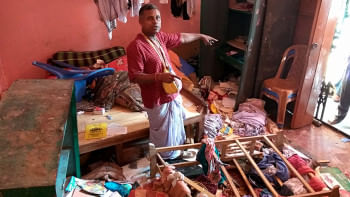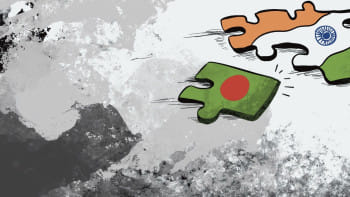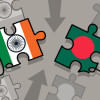Bridging borders, building futures

By the capricious grace of geography and the unyielding heft of history, Bangladesh and India are bound together, like conjoined twins linked by the same lifeblood, the rivers that course through our lands and the shared tragedies and triumphs of our past. Yet today, this bond stands strained, frayed by the abrasions of mistrust, poisoned by the venom of misinformation and tested by the heavy tread of political opportunism.
To repair the fragile ties between our nations, the chief adviser of the interim government of Bangladesh can consider the following recommendations, which are neither lofty abstractions nor partisan posturing—they are pragmatic imperatives aimed at staving off discord and building anew the bridges of cooperation. For the truth is plain: our nations have too much to lose from estrangement and far more to gain from solidarity.
Few nations in the world are so inescapably entwined as ours, and nowhere is this more evident than along our 4,096-kilometre border—a serpentine demarcation that is both a meeting point and a wound. Here, life plays out in sharp contradictions: smuggling routes that mock official trade channels, familial ties that transcend barbed wire, and, most tragically, the bodies of Bangladeshis struck down by Border Security Force (BSF) bullets, suspended grotesquely on fences of steel and cruelty.
This border, this scar etched into our shared flesh, must transform.
The chief adviser, as the head of the government, can form a national advisory committee comprising political leaders, civil society actors and government officials to collectively address the challenges of this volatile frontier. Through this body, grassroots tours can bring policymakers into direct contact with affected communities, fostering trust and countering the malignancies of misinformation. Cross-border trade zones, rather than barriers, can offer hope—economic lifelines replacing the smuggling networks that thrive in the absence of legitimate opportunity.
Our rivers are capricious, nurturing and destructive, soothing and raging, unifiers and dividers. The Teesta, in particular, has become the site of a festering dispute—a river of life turned into a stream of acrimony. Without equitable sharing, the drought-stricken farmers of northern Bangladesh face ruin, their fields barren and cracked under the sun's merciless gaze. Time-bound negotiations grounded in science and fairness can be pursued. The lessons of the Mekong River Commission, considered a triumph of regional cooperation, should guide us.
The challenge of water-sharing is inseparable from the spectre of climate change, whose rising seas and erratic rains are rewriting the rules of survival. Only through collaboration can our nations protect the rivers that sustain us.
Trade ought to be the beating heart of our economic partnership. Instead, it has become a sore point, a battlefield of imbalance. Indian goods dominate Bangladeshi markets, while our exports are stymied by bureaucratic red tape and thinly veiled protectionism. This asymmetry is not just an economic grievance; it is a political irritant, fuelling resentment and weakening the ties that bind us. Both governments must seize the opportunity for economic symbiosis. Bangladesh must gain greater access to Indian markets, especially in textiles, pharmaceuticals and IT—sectors where our industries have proven their mettle.
Simultaneously, attracting Indian investment in Bangladeshi infrastructure and energy projects can create jobs and foster goodwill. Trade need not be a zero-sum game; it can—and must—be a shared triumph.
During the upheaval of the July-August mass movement, as Bangladesh's youth rose against tyranny, voices from across the border joined the chorus. Indian students and activists stood in solidarity, reminding us of 1971, when India's people helped millions of Bangladeshi refugees and lent their strength to our struggle for freedom. This solidarity must not be a fleeting memory; it must become the foundation of a new chapter.
There can be robust youth and cultural exchanges, creating networks of understanding that transcend political turbulence. Universities, think tanks, and student unions can collaborate on shared challenges, from climate resilience to democratic renewal. Let the bridges we build in classrooms and seminar halls fortify the bridges of diplomacy and trade.
In this era of information warfare, narratives can shape nations. Bangladesh has been vilified and misrepresented in Indian media, and our responses have too often lacked coherence and reach. The stakes of this propaganda are high, threatening to deepen mistrust and derail dialogue. A comprehensive media strategy can be adopted, comprising regular rebuttals in international outlets, special press briefings in English and other global languages, and proactive engagement with the Bangladeshi diaspora to amplify our truths. Dialogues with Indian journalists and opinion leaders can help recalibrate the narrative, fostering a culture of mutual respect rather than mutual suspicion.
The most dangerous frontier, however, is not a physical one. It is the war of words, the rhetoric of division. Indian political leaders, particularly those of the BJP, have indulged in sabre-rattling, their inflammatory statements echoed by an ever-obliging media. In West Bengal, even Mamata Banerjee's once conciliatory tones have hardened, amplifying hostility rather than harmony. But let us not answer fire with fire. Let Bangladesh take the higher road, countering rhetoric with reason and aggression with appeals to our shared humanity. We must remind the people of India that our futures are brighter together than apart.
In a world besieged by authoritarianism, Bangladesh and India must reaffirm their commitment to democracy. For us, this means holding free and fair elections, inviting international observers, including those from India, to bear witness. Transparency will not only bolster our democratic credentials but also silence the voices of scepticism and distrust.
The rivers we share, the markets we trade, and the ideals we uphold bind Bangladesh and India in a destiny too profound to be undone by petty politics or misplaced pride. This moment of tension is also a moment of choice. Will we drift further into estrangement, or will we rise to the promise of partnership? The answer lies in dialogue, in understanding, and in the courage to build anew where old structures have crumbled.
Let us turn borders into bridges, water disputes into lifelines, and trade imbalances into engines of shared prosperity. Let us replace the ink of animosity with the spirit of unity, writing a new chapter in the history of Bangladesh-India relations—one of hope, trust and shared triumph. This is not just a diplomatic necessity; it is a moral imperative. It is a story worth telling and a future worth fighting for.
Bobby Hajjaj is a political activist and academic.
Views expressed in this article are the author's own.
Follow The Daily Star Opinion on Facebook for the latest opinions, commentaries and analyses by experts and professionals. To contribute your article or letter to The Daily Star Opinion, see our guidelines for submission.


 For all latest news, follow The Daily Star's Google News channel.
For all latest news, follow The Daily Star's Google News channel. 








Comments